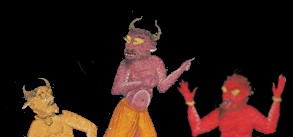EDUKATIF | The word genie derives from Latin genius, which meant a sort of tutelary or guardian spirit thought to be assigned to each person at their birth. English borrowed the French descendent of this word, génie; its earliest written attestation in English, in 1655, is a plural spelled genyes. The French translators of The Book of One Thousand and One Nights used génie as a translation of jinnī because it was similar to the Arabic word in sound and in meaning. This use was also adopted in English and has since become dominant.
The Door Jinn
The Arabic root JNN means "hidden, concealed", as in the verb janna "to hide, to conceal". (This is not to be confused with the Arabic word jannah, which means "paradise").[4][5][6] Arabic lexicons, such as William Lane's lexicon provide the rendered meaning of jinn not only for spirits, but also for anything concealed through time, status, and even physical darkness. In Arabic, the word jinn is plural; jinnī is the singular (and adjective). The feminine form is jinnīyah.
In other cultures, as in the Mythology Guanche (Tenerife, Canary Islands, Spain), also existed the belief in beings that qualify as genies, such as the so-called Gods paredros or Maxios (domestic spirits and nature), the Tibicenas (evil genies) and also demon Guayota (aboriginal god of evil) that, like the Arabic Iblis, is sometimes identified with a genie. The Guanches were of Berber origin in northern Africa which further strengthens this hypothesis.
Amongst archaeologists dealing with ancient Middle Eastern cultures, any spirit lesser than angels is often referred to as a djinn, especially when describing stone carvings or other forms of art.
The pre-Islamic Zoroastrian culture of ancient Persia believed in jaini/jahi, evil female spirits thought to spread diseases to people. However, Zoroaster himself did not believe in the existence of such evil female spirits.
Inscriptions found in Northwestern Arabia seem to indicate the worship of djinn, or at least their tributary status. For instance, an inscription from Beth Fasi'el near Palmyra pays tribute to the "Ginnaye", the "good and rewarding gods" providing a sharp resemblance to the Latin Genius and Juno: The Guardian Spirits.
Types of djinn include the Shaitan, the Ghul, the Marid, the Ifrit and the Djinn. According to the information in The Arabian Nights, Ifrit seem to be the strongest form of djinn, followed by Marid, and then the rest of the djinn forms.
Every person is assigned a special jinn to them, also called a qareen, the jinns that whisper into your soul and tell you to give in to your evil desires. Muhammad's jinn turned into a Muslim jinn, on the recitation of the Qur'an, as the jinn found it very beautiful.[15][16][17] However, the notion of a qareen is not universally accepted amongst all Muslims.
The King Solomon
(King Of The Kings)
The Quran states that King Solomon (Sulayman) is said to have compelled the Djinn into his service and given them dominion over 25 parasangs of his realm. In his court, the Djinn stood behind the learned humans, who in turn, sat behind the prophets. Solomon’s wife, the Queen of Sheba, was reportedly born of the marriage between a Djinn and a human, some sources suggesting a Djinn named Rayḥāna was her mother. It was this connection to the Djinn that made people apprehensive about Solomon’s marriage to her. They feared that if their master Solomon married a half-Djinn, they would be forced to remain in the service of the offspring of that marriage forever. Thus, to make Solomon fall out of love with her, they told him that she was insane, and that her feet were hairy and resembled those of a donkey.
The Djinn remained in the service of Solomon, who had placed them in bondage, and had ordered their king, Zūba’a, to perform a number of tasks throughout his life. Upon Solomon’s death, however, Zūbaa went to the places where his subjects were toiling, and called out to them to stop working. They happily obeyed, and one of them carved a message in stone, enumerating what they had built during their servitude.
The Cloud Jinn
In Islamic theology jinn are said to be creatures with free will, made from 'smokeless fire' by Allah in the same way humans were made of earth.[10] According to the Qur'an, Djinn have free will, and Iblis used this freedom in front of Allah by refusing to bow to Adam when Allah told Iblis to do so. By disobeying Allah, he was thrown out of Paradise and called “Shaitan”. Djinn are frequently mentioned in the Qur'an, Sura 72 of the Qur'an (named Al-Jinn) is entirely about them. Another Sura (Al-Nas) mentions Djinn in the last verse.[11] The Qur’an also mentions that Muhammad was sent as a prophet to both “humanity and the Djinn”.[12][13]
Similar to humans, jinn have free will allowing them to follow any religion they choose. They are usually invisible to humans and humans do not appear clear to them. However, jinn often harass and even possess humans, for various reasons, such as romantic infatuation, revenge, or because of a deal made with a practitioner of black magic. Jinns have the power to travel large distances extremely quickly and live in remote areas, mountains, seas, trees, and the air, in their own communities. Like humans, jinns will also be judged on the Day of Judgment and will be sent to Heaven or Hell according to their deeds.
Jinn picture, taking by camera
In several verses in Old Arabic and Old Persian Bible translations, the words: Jinn(جن) Jaann(الجان) Majnoon(مجنون) and Iblees(ابلیس) are mentioned as translations of familiar spirit or אוב(obe) for Jaann and the devil or διάβολος diabolos for Iblees ديأبليس.
In Cornelius Van Allen Van Dyck's Arabic translation of the Bible these words are mentioned in Lev 19:31, Lev 20:6, 1Sa 28:3, 1Sa 28:7, 1Sa 28:9, 1Ch 10:13, Mat 4:1, Mat 12:22, Luk 4:5, Luk 8:12, Joh 8:44 and other verses as well.
Genderuwo
( in indonesia, jinn called Genderuwo)
The social organization of the jinn community resembles that of humans - such as they have kings, courts of law, weddings, and mourning rituals.[19] Muhammad reportedly divided jinn into three classes: those who have wings and fly in the air, those who resemble snakes and dogs, and those who travel about ceaselessly.[20] Abd Allah ibn Mas'ud (d. 652), who was accompanying Muhammad when the jinn came to hear his recitation of the Quran, described them as creatures of different forms; some resembling vultures and snakes, others tall black men in white garbs.[21] They may even appear as dragons, onagers, or a number of other animals.[22] In addition to their animal forms, the jinn occasionally assume human form to mislead and destroy their human victims. One such jinni who had assumed the form of a beautiful woman was identified because of her beastly feet by her human victim, who killed her by throwing a rope around her neck and dragging her behind his camel.[23] This type of jinn is called mardāzmā, (tester of men) among the Baluch people.[24] Muhammad is also said to have told the jinn that they may subsist on bones, which will grow flesh again as soon as they touch them, and that their animals may live on dung, which will revert back to grain or grass for the use of the jinn flocks.
Ibn Taymiyyah believed the Jinn were generally "ignorant, untruthful, oppressive and treacherous".
Muslims believe that the Jinn account for much of the "magic" perceived by humans, cooperating with magicians to lift items in the air unseen, delivering hidden truths to fortune tellers, and mimicking the voices of deceased humans during seances.









.jpg)



